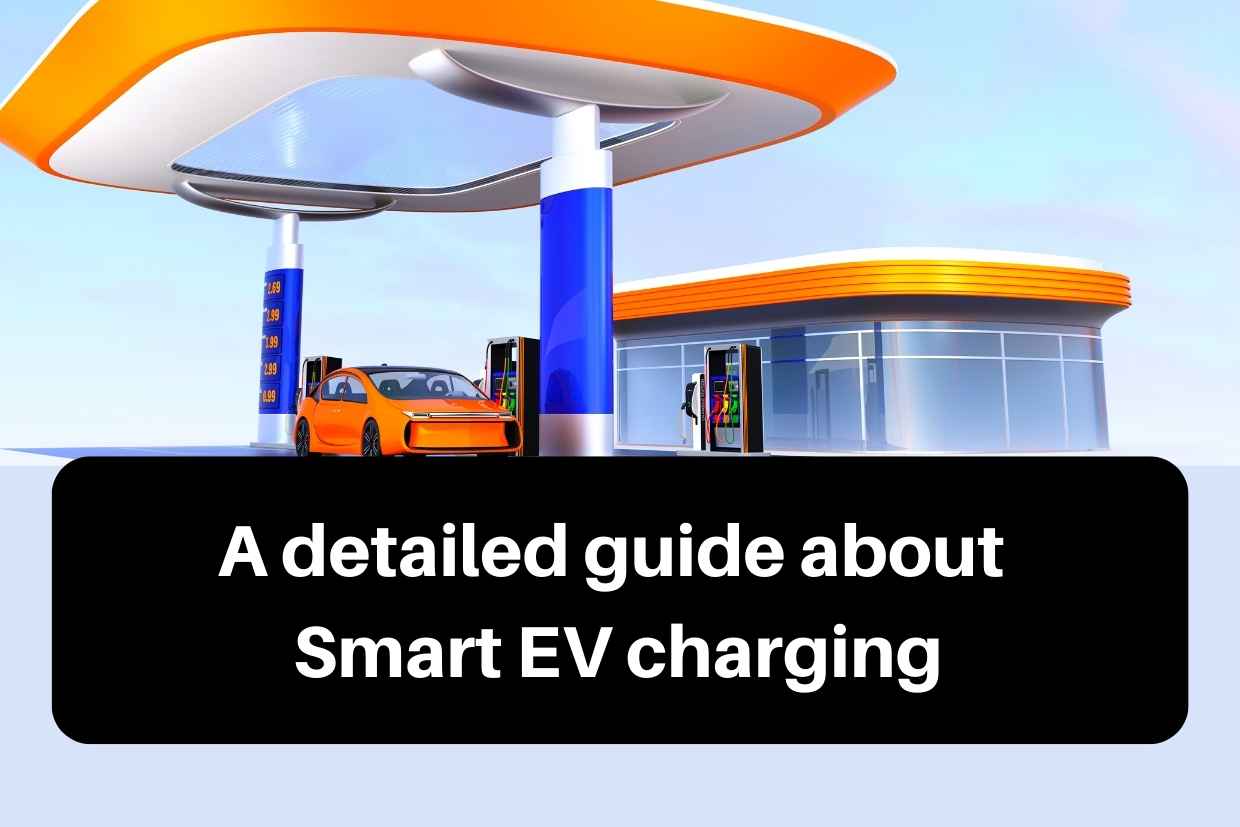What is EV Smart Charging?
Connecting your electric vehicle to the power grid enables “smart EV charging,”. It allows you to manage your electric vehicle’s charges smartly. Connecting charge sites with customers and operators is the fundamental concept behind Smart Charging. An electric car at a charging station communicates with a centralized cloud-based management platform using Wi-Fi or Bluetooth. And it relays information about the charging process. This cloud may also receive additional data that is delivered to it.
It can include information about the local grid, its capacity and how energy is utilized at the charging point. The software that powers the platform visualizes the vast amount of data it stores in real-time. The charging operators are now able to remotely regulate the amount of energy used through the use of a website or mobile application. The ultimate objective of Smart Charging is to maximize efficiency in terms of energy consumption throughout the process of charging electric vehicles.
Smart energy management optimizes energy sources.
The optimal time to charge a vehicle and the type of energy used is determined by the software that intelligently manages energy. The software’s load balancing is nearly real-time and dynamically distributes energy to and from the grid. It helps to prevent the demand from exceeding the grid’s capacity during peak usage. The software provides advanced algorithms.
The smart energy management system may use onsite renewable sources like solar panels to provide the necessary power to charge the vehicles. Simultaneously, it reduces the charging capacity of individual charge points. This results in a lengthening of the time it takes for plugged-in cars to charge while simultaneously reducing the stress on the grid. You can use smart energy management to capture and store excess generation during low-demand periods. It can then be distributed to chargers or sent back to the grid to assist in meeting peak demand. These qualities have the potential to help a place in lowering its maximum capacity as well as its expenses.
What Do Electric Vehicle Drivers Want from Smart Charging?
EV drivers desire to charge anywhere, at any time they prefer. They want chargers to be readily available and straightforward to use. EV drivers demand comprehensive transparency, including real-time information on charger availability and clarity on peak and off-peak pricing. Drivers can save money and reduce the overall EV cost by using smart EV charging.
An easy-to-use smartphone application is essential for a flawless charging experience. It can find smart chargers inside and outside the operator’s network, providing real-time charger availability and roaming support information. The software may also track transactions, manage payment methods, and provide complete billing plan information. EV drivers frequently look for smart EV charging because of its increased control. Here, the driver doesn’t have to physically plug in the car (also known as “dumb charging“). It allows them to determine the amount of charge they want and the period they want it to take over their network.
Vital Features of Smart Charging Power Sharing
Power Sharing
Power Sharing is a method that enables network operators or enterprises to balance the available energy capacity across all active electric vehicle charging stations. Because the amount of electricity accessible at each location is finite, an increase in the energy demand would often necessitate costly changes to the electrical infrastructure. By ensuring that electricity is delivered in the most effective manner possible, smart charging makes it possible to avoid needing such updates.
Power Boost
Smart EV charging has a feature called Power Boost, which is also known as peak shaving. This feature keeps you from surpassing the maximum amount of energy your home can consume. It is not a good idea to push oneself to their total energy capacity. Your energy provider may charge you additional fees because you used more electricity than was budgeted.
It is likely to happen if you use energy-intensive appliances like a washing machine later in the month. Power Boost can prevent this by distributing the load evenly across the charger and the other electronic devices in the home. When it appears as though you are about to exceed your vehicle’s maximum capacity, the smart charging control system will automatically decrease the amount of power consumed by the car.
Benefits of Smart EV Charging
Finding EV charging stations
When an EV charging station is connected to a charging network, drivers can check to see if the station is available or not. Also, they can reserve the station if necessary. In addition, drivers can help others while earning additional revenue by renting out the EV charging stations in their homes to others. The device owner can decide who can use it, including himself, his friends, or anyone connected to the network.
Monitoring the electric consumption
Connecting the EV charging device to a charging service, which automatically collects consumption statistics, is one solution to the problem of disagreements between you and your neighbors on your increasing electricity consumption. In this manner, EV charging costs are collected directly from the owner of the electric vehicle. The program can automatically report the costs of public and home charging to the employer, which is a helpful feature for users who are provided work automobiles.
Smart charging is safe.
Because smart devices immediately evaluate the connection between the car and the device before beginning the charging event, smart EV charging is substantially safer than conventional charging. Suppose there are many charging points on the same property. In that case, one could use dynamic load management to bring about an increase in levels of safety. If it is necessary, charging events can be stopped remotely.
The Last Word: Smart Charging in a Nutshell
A data connection is established between an electric car and an EV charging device as part of the smart charging system. Additionally, this system establishes a data connection between the EV charging device and a charging operator. This makes it possible to exercise control over a charging event in real-time. In its most basic form, smart charging consists of charging equipment connected to a back-end service that monitors, manages, and restricts the device’s use.
The term “Smart EV charging” refers to a collection of functions, each uniquely performing its function. These features include dynamic load balancing, vehicle-to-grid technology, and satellite arrangements. If you are interested in having an EV charging station on your premises, contact the best in Singapore, MNL Asia EV charger installation services today.


